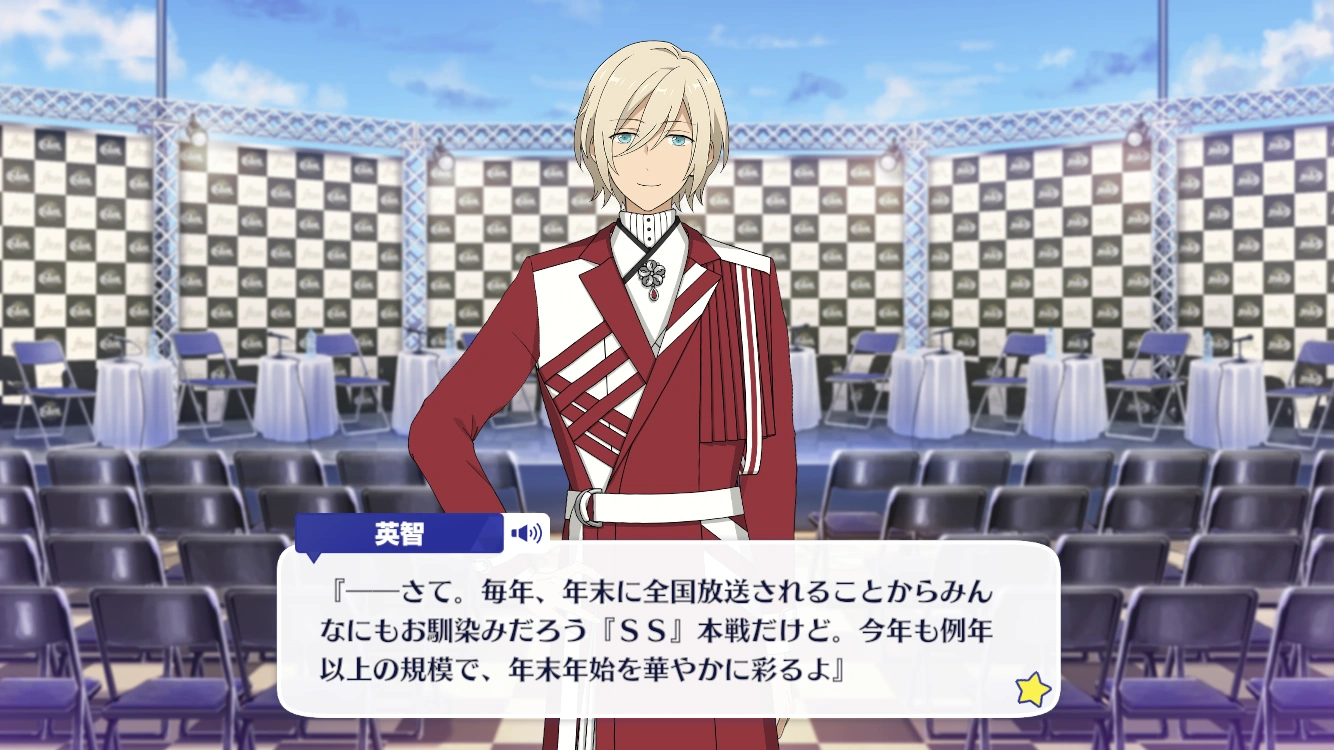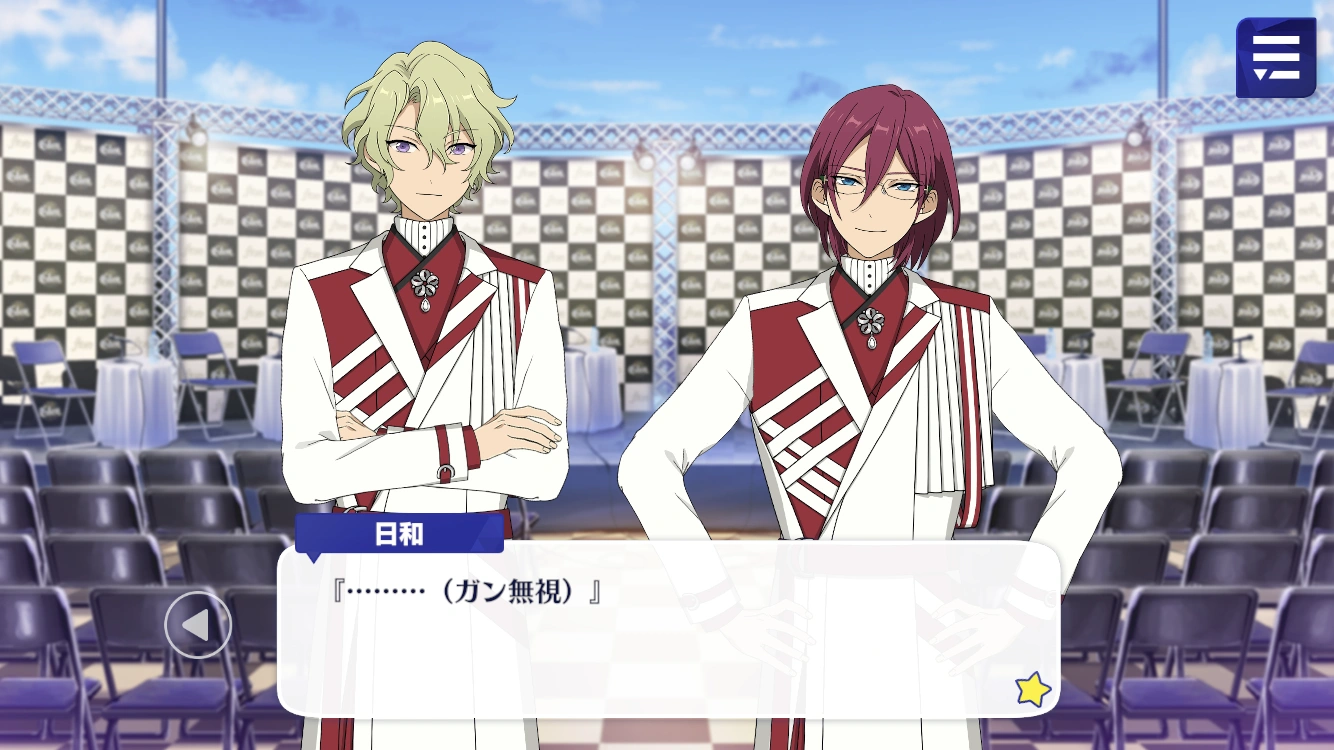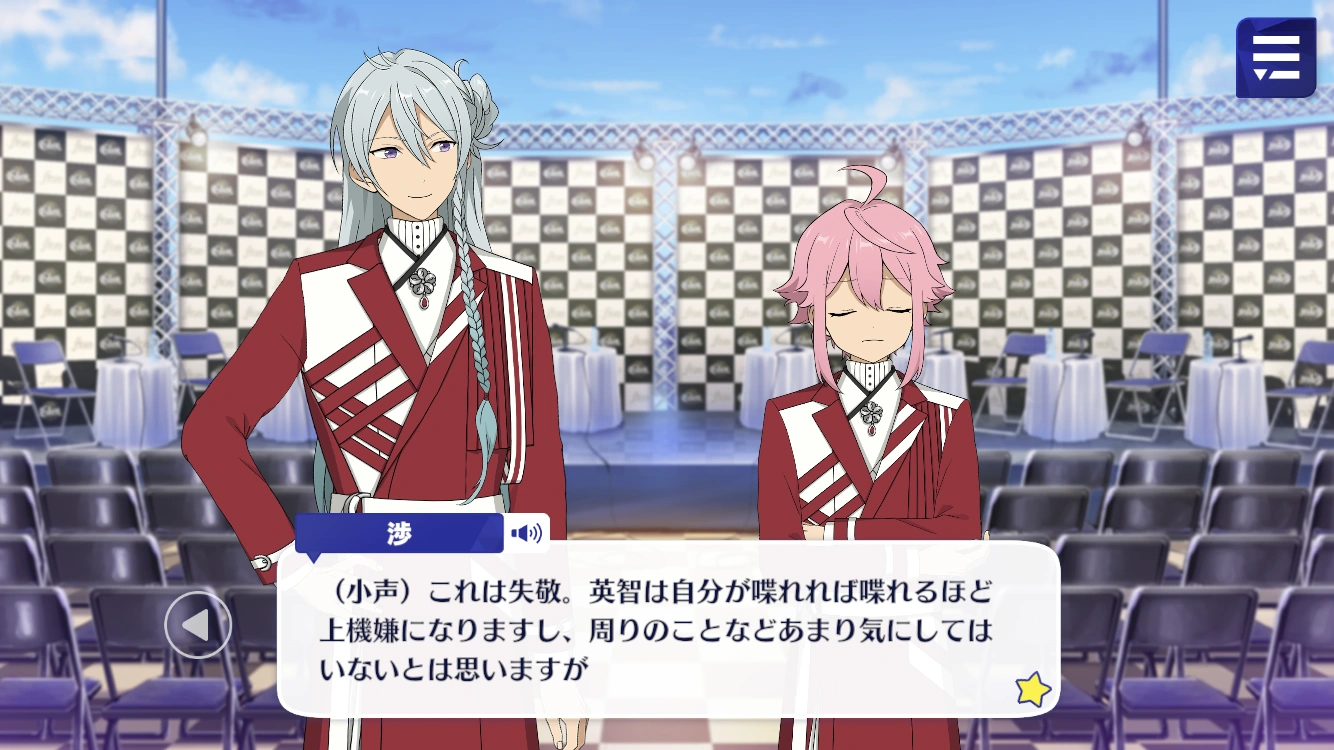Chapter 10

“—Now then. I’m sure you’re all familiar with the SS Finals, the year-end, nationwide broadcast. However, this year will will be an even bigger event; it’ll be sure to bring a certain pizzazz to your new year.”
“The Finals will take place on New Year’s Eve—December thirty-first.”
“Over the course of the day, the idols who were selected to move on from the Qualifying Rounds around the nation will take turns performing.”
“I hope you’ll enjoy watching it with your friends and family.”
“By the way! The event will take place at the commonly dubbed ES Dome, which was constructed for this SS in the Chubu region!”
“It seems that all of the advance tickets have sold out.”
“However! Around the dome, idols who are not participating in the Finals will be entertaining people through a variety of performances.”
“I’m sure it’ll be an interesting way to watch the finals with them from the giant monitors set up in the area!”
“Let’s gather as big a crowd as we can to share the experience of the biggest festival in the idol industry! Let loose and enjoy yourselves!”
(…Well, those entertaining the masses outside of the ES Dome are the second- and even third-rate idols who couldn’t move onto the Finals.)
(But it would have been not only a waste, but also dangerous to leave them be.)
(Having tasted the humiliation of defeat in the Qualifying Rounds, we’ll need to properly drain them of their poison and noxious gases.)
(The guests will all be drunk on a good time at the festival, and they’ll shower the idols in praise and pleasure…)
(And then, seeing the smiles on everyone’s faces, their war-torn hearts will be mended.)
(Even losers need hope in order to survive until the new day.)
“Fufu. During the SS Finals at the end of the year, the charming and attractive idols who won the Qualifying Rounds across the country will perform for you.”
“This selection of idols will be divided among a Red Team and a White Team. Yes, this year’s Finals will be a group event—a battle between the two teams.”
“It’s actually quite similar to the singing competition that aired at the end of every year a long time ago.”
“Fufu, I’m sure the older generation would be more familiar with it, then.”
“I don’t believe it’s any particular mimicry or parody of the original, but the Administration seems to have taken its mechanics as a point of reference.”
“In any case, this year will look a little different from the the Finals held up until now, where a sole unit would prevail in a tournament battle.”
“Instead, it will be more like the decisive battle of Sekigahara—”
“A battle on a massive scale, where two factions try to one-up and outwit each other.”1
“But merely explaining it won’t help you to understand very well… Seeing is believing, isn’t it? So how about we give you a demonstration?”
“As I said at the beginning of the program, the attire we have on holds significance—During the SS Finals, fine has been designated to the Red Team.”
“It’s pretty refreshing, actually, since fine’s image color is a pure, untainted white.”
“And Eden will be part of the White Team! Salute~ ☆”
“His Highness Hiyori and His Excellency Nagisa were originally part of fine—I’m sure you’re both profoundly moved to be wearing such nostalgic colors, yes?”

“…… (ignoring him completely)”
“…Hm? Oh, yes. We are.”
(What’s with that wishy-washy reaction?! Of course, it’s better than flying into a frenzy over it, but we’re in the middle of filming! I need you to have more conviction!)
“Fufu. For the duration of the Finals, one unit each will be selected from the Red Team and the White Team to become representatives for their team.”
“Each representative will challenge each other on stage in a one-on-one live showdown.”
“I wonder—Need I explain the premise of a live showdown now that we’ve gone through the Qualifying Rounds?”
“I’ll give just a brief explanation: The two units will perform on stage, and the the audience will decide who is the better among them with their votes.”
(whispering) …Why would he not just call it a Dream Fes?
(whispering) …That term has not yet entered into widespread use. SS is a nationwide affair, and many people still don’t know the ins and outs of ES, or the technical terms we use.
(whispering) I see. Then it’s best to explain it using words that the general public would know.
(whispering) Yes. Even during the Qualifying Rounds, we tried to use words and phrases that weren’t too difficult to understand.
(whispering) But it does give off the feeling that we’ve instead dumbed it down a little too much.
(whispering) But even so, it’s better than not being able to understand at all, I imagine.
(whispering) If we suddenly start talking about Dream Fests, it will be hard for them to follow along. But if you put the words “live” and “showdown” together, it’s easy to piece together the meaning.
(whispering) It’s like the difference between phonetic and ideographic spelling.2
(whispering) …Quit whispering to yourselves when Eichi-sama’s talking.

(whispering) Oh, how rude of me. The more Eichi gets to talk, the higher his spirits rise. I don’t think he cares all that much about those around him, though.
(Actually, hmm… The Princess really is acting strangely.)
(He always stares us straight in the eye when he speaks, but now he won’t even look at Eichi, even though he claims to love him so.)
(I wonder, is something bothering him? Or could it be…?)
The Battle of Sekigahara was the largest battle in feudal Japan, and is considered among the most important. It’s the battle where Tokugawa Ieyasu’s faction successfully defeated the Ishida Mitsunari loyalists to supplant the previous shogunate and install Tokugawa as the first ruler of Japan during the Edo Period (1603-1868).
Yuzuru is talking about two ways you can use kanji. Since kanji is a ideographic syllabary (meaning that each kanji represents an idea or concept, such as “tree” or “mind” as opposed to a unique sound, like A or T) most words are spelled using these ideographs—“tree” is spelled 木 (ki) because the kanji 木 looks like a tree. It doesn’t have anything to do with the actual pronunciation of the word (and in fact the kanji has several different ways it can be pronounced depending on how it’s used).
Ateji, though, is a way of using kanji phonetically. It disregards the conceptual meaning of the kanji and only focuses on how it’s pronounced. Words like 多分 (tabun, probably) use these specific kanji because that’s the sound those kanji make. 多 (ta) means “many” and 分 (bun) means “part” and if you stick them together they mean… “probably” ?? This system is also how you can give loan words proper kanji (such as coffee: 珈琲 koohii), even though they were never Japanese words to begin with!






